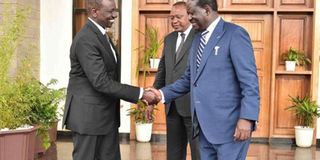Tragedy of our democracy of mere numbers

President Uhuru Kenyatta (centre), DP William Ruto (left) and ODM leader Raila Odinga. What kind of referendum should Kenyans have because the politicians’ plebiscite is not necessarily the people’s plebiscite? PHOTO | FILE | DPPS
What you need to know:
- For the Kalenjin, Kamba, Kikuyu, Luhya, Luo and other large ethnic communities, there is really no question about it.
- The President of the Republic of Kenya must and will always be either a Kamba, a Kikuyu, a Luhya or a Luo man.
- In Kenya, the Kikuyu, a Bantu community, are, by population, the largest ethnicity.
Will Kenyans ever one day begin to enjoy anything resembling a just national political choice as a matter of course?
I would stress the word national because, quite evidently, it will never happen until most of us have, as individuals, liberated our minds from the ethnic igloos in which we were born and where our thoughts remain glued and stranded.
The headline writers of our newspapers daily make manifest the ethnic igloos in which our minds remain cocooned.
It is probably unconsciously that our newspaper producers do it again and again.
For instance, what was the meaning of the headline “Mt Kenya warms to opposition” carried on page one of the Daily Nation of Tuesday, December 18?
POLITICAL CHOICE
For it stressed the fact that what masquerades as political choice in our country is really nothing but profound tribal subjectivism.
For the Kalenjin, Kamba, Kikuyu, Luhya, Luo and other large ethnic communities, there is really no question about it.
The President of the Republic of Kenya must and will always be either a Kamba, a Kikuyu, a Luhya or a Luo man.
I say “man” because each of those and Kenya’s other ethnic and racial communities is dominated by individuals whom female liberationists the world over call “male pigs”.
Indeed, so it will always be until Kenya devises a waterproof method by which to eliminate smallness of the mind from our political minds.
That statement makes it manifest that Kenya’s president will always be male and always come from a certain very large ethnic community.
Of course, he or she may be a properly educated and good individual. The only problem is that such an eventuality is never guaranteed.
Our erstwhile Caucasian Euro-North American teachers always taught us — and, like children — we always accepted the teaching — that, in a “democracy”, whomever the human majority votes for is the legitimate and even the best leader. Yet, of course, the choice is always a he, a character quite likely to have been reared in a stinking male pigsty.
MAJORITY
However, the statement that a majority — a mere number (and not anything else) — is the criterion of good leadership cries out as nonsensical. Shouldn’t it automatically disqualify ideology and religion as criteria of legitimacy and even of goodness? Indeed, nobody whom I have read has ever really posed one manifestly significant question: How does a mere majority — how does a mere number confer social goodness on a group of would-be ruling human beings?
In Kenya, the Kikuyu, a Bantu community, are, by population, the largest ethnicity.
BLOOD THICKER THAN WATER
Moreover, as the English people used to put it, blood is thicker than water.
That is why, in Kenya, other ethnic Bantu communities are always likely to vote for a Kikuyu or even Giriama or Luhya candidate, rather than for a Kalenjin, Luo, Maasai or any other Nilotic candidate.
But how can Kenya rapidly wriggle out of the ugly conundrums of tribalism and racism?
I do not know any way out except to appeal to the leaders of Kenya’s ethnic and racial communities to take their own initiatives and lead their respective ethnic and-racial peoples into a new national unity of ethnic and racial communities designed to lead Kenya as rapidly as can be into a single national whole.
Inter-racial marriages may help.
But that is an extremely subjective choice on which no development planner can put any premium.
It is, nevertheless, an important choice which leaders should powerfully encourage.
Mr Ochieng is a veteran journalist.





